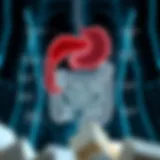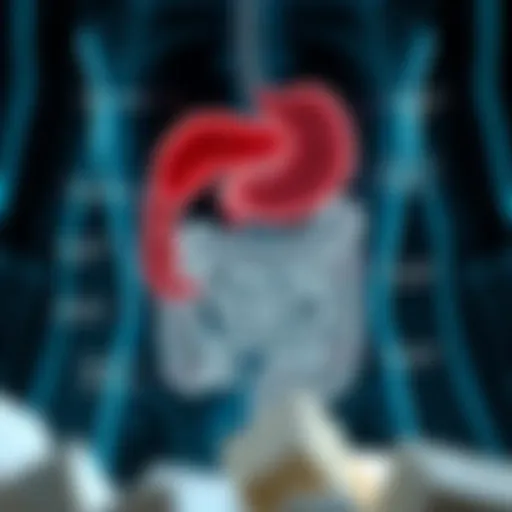Comprehensive Strategies for Cold Sore Relief


Intro
Cold sores can be a real nuisance, popping up at the worst possible moments—like during a big presentation or that important date. Caused primarily by the herpes simplex virus, these painful blisters are far from just an aesthetic concern. They can lead to significant physical discomfort as well as emotional distress. Therefore, understanding effective treatments and preventive measures is crucial for anyone who suffers from this condition.
In this article, we will assess various medicinal options, explore natural remedies, and discuss actionable steps to prevent future outbreaks. With the most recent research and expert insights at our fingertips, we are set to provide a well-rounded guide to managing cold sores successfully.
Health Benefits
Physical Health Benefits
Managing cold sores effectively can lead to noticeable improvements in your overall physical well-being. Here’s how:
- Pain Reduction: Treatment methods aim to minimize the discomfort associated with outbreaks. Over-the-counter creams can numb the affected area, while antiviral medications work to shorten the duration of the symptoms.
- Reduced Frequency of Outbreaks: Consistent use of preventive treatments can lead to a decrease in the frequency of cold sore occurrences. This not only alleviates immediate pain but also lessens the overall strain the condition can place on your immune system.
- Faster Healing: Some topical treatments promote faster skin recovery, meaning you’ll be less likely to suffer longer episodes that can interfere with everyday life.
Mental Health Benefits
The emotional impacts of dealing with cold sores shouldn't be underestimated:
- Increased Confidence: Effective management leads to fewer visible cold sores, allowing individuals to feel more confident in social interactions. This reduction can significantly affect one's quality of life.
- Better Mental Well-being: Knowing that there are treatment options can put one’s mind at ease. When the fear of outbreaks reduces, so does anxiety related to social situations, work stress, and personal relationships.
- Empowerment through Knowledge: Understanding the causes and treatments of cold sores equips individuals with the tools they need to take control of their condition, fostering a sense of empowerment.
"Knowledge is power. The more you know about your condition, the better you can manage it."
Practical Tips
Healthy Eating Guidelines
Proper nutrition plays an essential role in maintaining a strong immune system, which can, in turn, help keep cold sore outbreaks at bay. Here are some suggestions:
- Incorporate Foods Rich in Lysine: Foods like yogurt, fish, and legumes may help prevent outbreaks.
- Stay Hydrated: Drink plenty of water to maintain skin health and improve recovery times.
- Limit Arginine Intake: Foods like nuts and chocolate contain high levels of arginine. Keeping these to a minimum could be beneficial as arginine can promote herpes virus replication.
Effective Workout Routines
While exercise doesn't directly prevent cold sores, maintaining a regular fitness routine can support your immune function. Consider the following:
- Cardiovascular Activities: Engaging in activities like jogging, cycling, or swimming can help boost your immune system.
- Mindfulness and Stress-Reduction Techniques: Practices such as yoga or tai chi not only promote physical health but also reduce stress, which is a known trigger for outbreaks.
- Strength Training: Building muscle can enhance overall health, but don’t overdo it. Moderation is key to avoiding fatigue that can compromise your immune system.
Understanding Cold Sores
When it comes to cold sores, understanding their nature is crucial. These pesky blisters, caused primarily by the herpes simplex virus type 1 (HSV-1), affect many individuals globally. Grasping the fundamentals can pave the way to effective treatment and preventive strategies, which is what this article aims to deliver.
Cold sores often reveal underlying issues in the immune system. They can be triggered by stress, fatigue, or even environmental factors such as sunlight. Understanding what causes them can aid individuals in managing their lifestyle and the triggers associated with outbreaks. Moreover, for healthcare practitioners, this knowledge is vital to provide informed advice and treatment options to patients.
What Causes Cold Sores
Cold sores are primarily caused by the herpes simplex virus, which many people contract during childhood through casual contact, such as sharing utensils or kissing. Once the virus is in the system, it might remain dormant in the nerve cells. Various factors can awaken it from its slumber, including:
- Stress: High anxiety can disrupt the immune system, leading to flare-ups.
- Fatigue: Lack of sleep diminishes your body's ability to fight off illnesses.
- Illness: Any illness that compromises your immune system creates a ripe environment for outbreaks.
- Sun Exposure: UV radiation can be a significant trigger, prompting the virus to reactivate.
Understanding these causes helps individuals strategize on how to minimize their risk factors. For example, managing stress through mindfulness or ensuring adequate rest can significantly impact their overall well-being.
Symptoms to Identify
Recognizing the symptoms of a cold sore early can be vital for effective management. Some of the common signs include:
- Initial Tingling: Many people report a tingling or tingling sensation before any visible outbreak. This may occur one or two days before the actual blister appears.
- Blisters: Small, painful sores usually appear on or around the lips. They're often filled with clear fluid.
- Crusting: After a few days, the blisters break and crust over. It’s crucial not to pick at these as it can lead to secondary infections.
- Pain: There can be a significant sore, itchy or burning sensation associated with the blisters.
Being able to identify these warning signs enables prompt treatment, lessening the duration of outbreaks and potential transmission to others.
The Lifecycle of the Virus


The lifecycle of the herpes simplex virus is quite fascinating and helps shed light on why cold sores can be such an enduring issue for many. Once contracted, the virus enters the body and replicates, usually causing an initial outbreak that can be severe. After this period, the virus can go into a latency phase where it hides in the nerve cells. Here’s how it typically evolves:
- Initial Infection: This is when most people first experience symptoms such as fever, swollen lymph nodes, and the appearance of blisters.
- Dormancy: After the initial outbreak, the virus becomes inactive. This can last from weeks to years.
- Reactivation: Various triggers can cause the virus to 'wake up', leading to recurring outbreaks.
This continuous cycle of dormancy and reactivation emphasizes the need for a comprehensive understanding of cold sores, not just for affected individuals but also for health practitioners.
By recognizing the factors involved in cold sore outbreaks, individuals can take proactive measures to better manage their condition.
Understanding these aspects of cold sores serves as the foundation for exploring effective treatments and management strategies later in the article.
Medicinal Treatments for Cold Sores
When one thinks about effectively tackling the unpleasant reality of cold sores, medicinal treatments often come to mind first. This section dives into why these treatments are vital, weighing their benefits against what one should consider while using them. The herpes simplex virus can cause outbreaks that disrupt daily activities, and knowing how medicinal approaches can provide relief is imperative for many.
Antiviral Medications
Commonly Prescribed Antivirals
Antiviral medications like acyclovir, valacyclovir, and famciclovir take center stage in the fight against cold sores. These medications are usually perceived as first-line options due to their ability to shorten the duration of outbreaks and lessen the severity of symptoms. A key characteristic that makes these antivirals quite prevalent is their targeted action against the virus, helping to inhibit the replication process within the body.
However, they aren’t free from drawbacks. Not everyone might find them equally effective, and the effective dosage can vary based on individual health factors. Thus, their unique feature lies in their capability to provide rapid relief, but their efficacy can sometimes come with a learning curve for the patient.
Dosage and Administration
Understanding the right dosage and how to take these medications is crucial. Most antiviral medications come in various forms—tablets, creams, or intravenous. Once again, valacyclovir holds particular importance due to its convenience; it usually requires less frequent dosing than acyclovir, making life a bit easier for those dealing with frequent flare-ups. This is one reason demonstrated a popularity in prescriptions; fewer doses can mean higher compliance.
However, one should consider that the route of administration may come with unique features, like possible side effects upon intravenous administration. Getting the dosage right is key, as too high may lead to adverse reactions, while too low might not yield the desired effects.
Topical Treatments
Over-the-Counter Options
Over-the-counter options provide immediate accessibility. Creams containing benzyl alcohol and docosanol stand out as notable choices, giving folks a chance to fend off flare-ups without needing a prescription. The primary appeal lies in their ease of access, allowing individuals to treat early signs of an outbreak without hassle.
While many find them beneficial, there’s variability in how effective these treatments really are. Some people experience instant relief, while others feel that the effect is more theoretical than practical. More so, the unique feature of these creams is that they mainly work best when used at the first signs of a cold sore, making prompt action imperative for optimal results.
Prescription Strength Creams
When over-the-counter options fall short, prescription strength creams like acyclovir cream may come into play. They often contain higher concentrations of active ingredients, tailored to provide more significant relief. Their effectiveness in reducing healing time is a strong selling point.
On the flip side, even though prescription creams can be game-changers, they require a visit to the doctor, which not everyone prefers to deal with. They usually come with a higher cost too. A unique feature here is their targeted application, which means they’re meant for those who are in urgent need of quicker symptom management.
Oral Remedies
Effectiveness of Oral Medication
Oral medications deserve their place in the spotlight as well. They can offer an overall impact that topical treatments sometimes can’t equal. The general consensus is that oral meds can effectively manage multiple outbreaks, even in those who struggle with frequent flare-ups. Their influence goes beyond merely alleviating symptoms; they can help in managing the virus effectively in the long run as a preventive measure.
People often praise the convenience, as they’re not tied down to applying creams multiple times a day. However, it’s worth noting that those sensitive to processing medications through their digestive systems might find oral medications less favorable. The unique aspect of oral medications is their systemic approach; while topical creams have localized effects, oral therapies work to influence viral behavior throughout the body.
Potential Side Effects
It's vital to address the potential side effects, as no treatment is without them. While most side effects are mild—like nausea or headaches—some could experience more serious reactions, especially those with pre-existing conditions. Understanding the side effects may seem intimidating, but being informed helps manage expectations better. Each medication comes with its pros and cons; thus, the key is to engage in an open dialogue with healthcare providers about personal health history and concerns.
In summary, medicinal treatments for cold sores provide a multi-faceted approach to handling outbreaks effectively. These treatments, whether oral or topical, bring with them specific benefits and considerations that cater to individual needs. With effective usage and proper guidance, they can offer significant relief for those afflicted.
Natural Remedies for Cold Sores
In discussing cold sores, one can't overlook the potential of natural remedies. These treatments often represent a more holistic approach to tackling the painful and unsightly blisters caused by the herpes simplex virus. As pharmaceutical options can have side effects or interactions, many individuals seek alternatives that may be gentler and easily accessible. Incorporating natural remedies in your cold sore management plan can often reduce the recurrence of outbreaks and provide symptomatic relief.
Natural solutions are not just about alleviating symptoms; they aim to support the body in healing itself. The relatively mild side effects of herbal treatments, along with their ability to enhance immune functions, makes them an attractive choice for many.


Herbal Treatments
Benefits of Herbal Solutions
Herbal solutions have long been revered for their healing properties. One of their key characteristics is the variety of active compounds that can work synergistically to soothe irritation and speed up recovery times. Ingredients like echinacea or lemon balm have shown promise in fighting the viruses through their antiviral properties. This contributes significantly to the overall goal of managing cold sore outbreaks without the harshness of some medicinal treatments.
The unique feature of these herbal solutions is their accessibility. Many can be found in local health stores or even grown in one's backyard. That said, it's vital to ensure the quality and source of these ingredients.
A downside could be the variability in their effectiveness, as results can differ from one person to another. Individual responses depend on numerous factors, including overall health, the severity of the outbreak, and even the specific strain of the virus.
Preparation and Usage
Preparing herbal treatments can be a straightforward process. Many require simple steps like steeping in hot water to create teas or applying extracts directly to the affected area. This ease of preparation makes herbal remedies a go-to for those who prefer remedies without complex processes.
The key characteristic of this aspect is not only its simplicity but also the personalized experience it can offer. Individuals can adjust dosages or mix different herbs based on what they feel works for them best, honing in on their own cold sore treatment. However, there’s a caution here; not all herbs are created equal, and incorrect preparation can lead to diminished effects or side effects. It's always wise to consult knowledgeable sources or professionals.
Home Remedies
Common Household Ingredients
Household ingredients also offer a wealth of options for combating cold sores. Items like honey, coconut oil, and even garlic are often within arm's reach, making them not just accessible but also cost-effective. Honey, for instance, is known for its natural healing properties and can inhibit virus growth, while coconut oil soothes the skin and promotes moisture retention.
The benefit of commonly used household ingredients lies in their familiarity and ease of use. There’s something reassuring about treating a cold sore with something as simple as honey or aloe vera, bringing comfort as well as healing. Still, it's worth noting that effectiveness may vary and some ingredients could aggravate sensitivity based on individual skin types.
Safety and Efficacy
Safety and efficacy are paramount considerations when it comes to home remedies. While many household ingredients are generally considered safe, allergies or skin sensitivity cannot be ignored. It’s crucial to perform patch tests before full applications.
The uniqueness of home remedies is their traditional wisdom, often passed down through generations. They boast an added level of trust from families using them for years. However, while these remedies may show positive effects for some, they might not work for everyone, leaving individuals disappointed.
Preventive Measures
Understanding preventive measures is a cornerstone in efficiently managing cold sores. These steps can significantly reduce the frequency of outbreaks, allowing individuals to regain control over their lives. Prevention is not only about avoiding triggers, but also about fostering an overall lifestyle that supports resilience against the herpes simplex virus, making it crucial for anyone affected by the condition to comprehend these strategies.
Recognizing Triggers
Stress and Lifestyle Impact
Stress often acts as a double-edged sword. It's a common thread running through many health issues, including cold sores. The emotional toll of stress can weaken the immune system, heightening the vulnerability to outbreaks. Not only does stress create anxiety, but it can also disrupt sleep patterns and impede a healthy lifestyle, which are essential for overall well-being. Knowing that stress is a trigger for cold sores helps individuals focus on stress management techniques, such as mindfulness or regular physical exercise. These techniques not only aid in stress reduction but also improve one's quality of life. The key here is understanding how stress management is foundational in minimizing cold sore flare-ups, making it a beneficial focus for this article.
Environmental Factors
The weather can play tricks on your health, especially in relation to cold sores. Cold, dry air can cause cracks in the skin, giving the virus a welcoming environment to come out of hiding. Additionally, exposure to sunlight acts as a major trigger for many; those sunrays can wreak havoc on skin cells and immune responses. It's essential to recognize that environmental factors lie outside personal control to a certain extent, yet simple precautions can be taken. Wearing lip balm with SPF when outdoors or using a humidifier at home can mitigate some adverse effects. Understanding these environmental influences can empower individuals to take proactive measures and reduce the likelihood of an outbreak.
Hygiene Practices
Preventing Transmission
When it comes to preventing cold sores, hygiene can't be overlooked. The herpes simplex virus is highly contagious, oftentimes spreading without visible symptoms. Understanding the importance of good hygiene can dramatically cut down on transmission. Regular hand washing, especially after touching the face or cold sores, goes a long way. Not sharing utensils or personal items, like towels or lip products, can also prevent the virus from hopping on board. The crux of preventing transmission lies in the acknowledgment that vigilance pays off, protecting not just oneself but also caring for others around.
Proper Care for Blisters
Once a cold sore appears, proper care becomes paramount. Allowing blisters to heal appropriately can prevent secondary infections and reduce discomfort. Keeping the area clean and dry, using medicated ointments as directed, and not picking at the sores are essential to good care. Notably, preventing scabbing through appropriate moisture management can speed up healing time and lessen the overall duration of the outbreak. This proactive approach underscores the value of proper care, making it another critical element in the prevention discussion.
Role of Nutrition
Immune System Support
The body’s first line of defense against any infection is a well-functioning immune system, and nutrition plays an undeniable role in that. Proper nutrition equips the body with the necessary tools to fend off infections, including cold sores. Incorporating plenty of fruits and vegetables rich in vitamins and antioxidants into one’s diet enhances immune function. Regular hydration also contributes massively to overall health. The beauty of nutrition lies in its dual ability to nourish and protect, emphasizing its importance in the realm of preventive measures against cold sores.
Dietary Considerations


While we often think of nutrition in terms of what we should eat, it's equally important to consider what we should avoid. Foods high in arginine can spur outbreaks for some individuals; these can include nuts, chocolate, and certain grains. Instead, reaching for foods abundant in lysine may serve as a form of dietary safeguard. An understanding of these dietary nuances can empower individuals with actionable steps that help in minimizing outbreaks. Awareness of these factors solidifies why dietary considerations serve as an integral piece in the prevention puzzle.
Consulting Healthcare Professionals
Consulting healthcare professionals is an essential element of effectively managing cold sores. While it may be tempting to rely solely on over-the-counter treatments or home remedies, getting expert advice can significantly improve the management of outbreaks and potentially prevent complications. Health professionals can offer personalized strategies based on individual health circumstances, especially when dealing with recurrent infections.
When to Seek Help
Knowing when to seek help can be as crucial as the type of treatment chosen. Here are some situations where consulting a healthcare professional is advised:
- Frequent Outbreaks: If cold sore outbreaks are occurring more than three to four times a year, it may be necessary to get a professional opinion. Frequent episodes might indicate a need for antiviral medications as a preventive measure.
- Severe Symptoms: If the cold sore leads to intense pain, swelling, or if blisters continue to spread, it’s time to consult a doctor. Such symptoms could signal a need for stronger treatment options or assessment for other related conditions.
- Duration Concerns: If cold sores don't seem to heal within the usual time frame, consulting with a healthcare provider is prudent. More extended outbreaks could lead to secondary infections or other complications.
- Systemic Symptoms: Should cold sores coincide with other symptoms like fever, swollen lymph nodes, or general malaise, there can be more significant concerns at play.
Understanding these signs can help individuals decide when it’s best to place a call to their physician, ensuring timely treatment.
Questions to Ask Your Doctor
When you take the step to consult your healthcare professional, having a list of questions ready can maximize the benefits of the visit. Here are some key inquiries:
- What triggers my cold sores? Understanding personal triggers can help in creating a better management plan.
- What treatment options do I have? Request detailed information about antiviral medications, topical treatments, and any lifestyle changes that might aid in reducing the frequency of outbreaks.
- What side effects should I be aware of? Knowing potential side effects of medications can allow for more informed decisions.
- Are there alternative therapies? Inquire about natural remedies or holistic approaches that may complement standard medical treatments.
- How can I better manage stress? Since stress is a known trigger for many people, discussing stress management techniques may prove beneficial.
These questions can foster a productive dialogue and equip individuals with the tools needed for effective cold sore management. Remember, understanding your condition from a clinical perspective adds to the empowerment of effectively handling this viral infection.
The Psychological Impact of Cold Sores
Cold sores can be more than just a physical ailment; they often carry a heavy psychological burden. For many, the visibility of these sores affects self-esteem and social interactions. The discomfort, stigma, and anxiety linked to cold sores are significant and warrant serious attention. This section underscores the psychological ramifications of suffering from this condition and offers insights into effective coping strategies.
Emotional Effects
Experiencing a cold sore can trigger a range of emotional responses. Many individuals report feelings of anxiety prior to an outbreak, worried about how friends, family, or coworkers will perceive them. Cold sores may cause feelings of shame, not just about the sore itself, but also the virus that causes it, which can feel isolating. "I always feel like I have to hide when I get a cold sore. It's embarrassing," says a long-time sufferer. This emotional strain can lead to avoidance behaviors—spending less time with loved ones or skipping social events altogether.
Furthermore, the chronic nature of cold sores can contribute to ongoing stress and anxiety. Each outbreak is a reminder of the unpredictability of the virus, leaving many individuals in a heightened state of worry. They might constantly monitor their health and even have negative thoughts about their appearance. Such emotional challenges can lead to feelings of depression, particularly when outbreaks become frequent.
Coping Strategies
While the emotional effects of cold sores are profound, there exist several coping strategies that can help manage this psychological burden:
- Educate Yourself: Understanding cold sores and the herpes simplex virus can demystify the condition. Knowledge is power—knowing what to expect and how to manage it can alleviate fear.
- Open Communication: Sharing experiences with trusted friends or family members can create a support system. Talking openly about feelings can lessen the weight of shame.
- Mindfulness Practices: Activities such as yoga, meditation, and deep-breathing exercises can help reduce anxiety. Practicing mindfulness can promote emotional well-being, helping individuals focus on the present rather than the past or future fears.
- Join a Support Group: Connecting with others who share the same experience can be therapeutic. Whether online on forums like reddit.com or in local meetups, these groups can offer understanding and encouragement.
- Professional Help: For those struggling significantly, seeking the guidance of therapists or counselors can provide relief. They can provide coping mechanisms tailored to individual needs.
"It's normal to struggle with how you feel. But developing strategies helps empower me and puts me in a better headspace."
Support Groups and Forums
Support groups and forums act like a lighthouse in a stormy sea. They offer a safe harbor where people can share stories, seek advice, and vent frustrations related to cold sores. In these digital and physical spaces, individuals can connect with others who understand the emotional turmoil that often accompanies repeated outbreaks.
Here are some of the benefits of joining support groups:
- Shared Experiences: Members share their own journeys, creating a sense of belonging.
- Practical Advice: Many offer tips on managing outbreaks, from medication to lifestyle changes.
- Emotional Support: Sharing fears and frustrations often leads to relief and understanding.
Resources to consider:
- Reddit (r/coldsore): An online community where people swap advice and experiences regarding cold sores.
- Facebook Groups: Various groups dedicated to skincare and health where people can join discussions and link up with others.
Support groups are not just platforms for sharing woes; they are avenues for empowerment and solidarity.
Further Reading and Research
Extending your understanding of cold sores goes beyond immediate solutions. Engaging with further reading and research can illuminate the mechanisms behind outbreaks, emerging treatments, and even holistic approaches.
Some compelling areas to explore include:
- Current Medical Research: Articles published in medical journals, such as the Journal of Viral Diseases, can provide insights into the latest discoveries.
- Wellness Blogs and Articles: Websites like Healthline are frequently updated with new findings and reviews of treatments.
- Books on Viruses: Literature covering viral infections can deepen your understanding.
Don't forget to explore:
Engaging with comprehensive materials not only enhances understanding but might offer new strategies for prevention and management—giving one the upper hand in the battle against cold sores.















